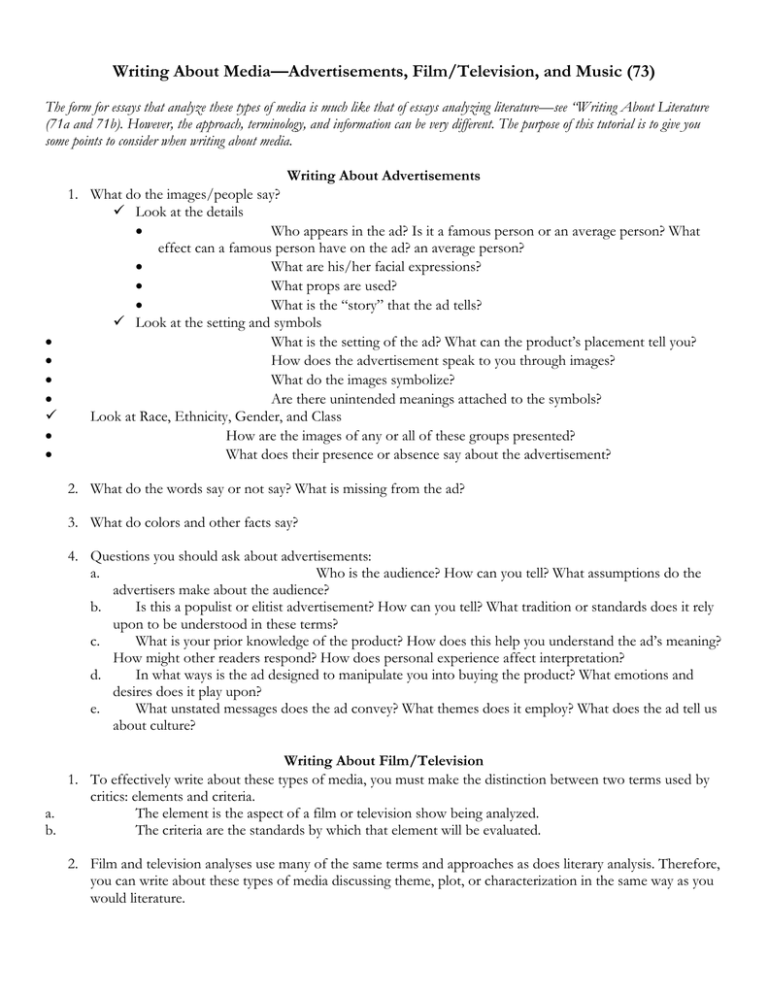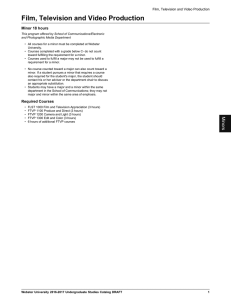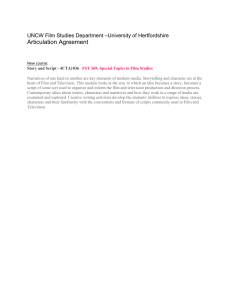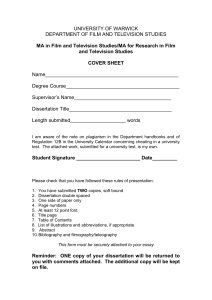Writing About Media Advertisements, Film/Television, and Music
advertisement

Writing About Media—Advertisements, Film/Television, and Music (73) The form for essays that analyze these types of media is much like that of essays analyzing literature—see “Writing About Literature (71a and 71b). However, the approach, terminology, and information can be very different. The purpose of this tutorial is to give you some points to consider when writing about media. Writing About Advertisements 1. What do the images/people say? Look at the details Who appears in the ad? Is it a famous person or an average person? What effect can a famous person have on the ad? an average person? What are his/her facial expressions? What props are used? What is the “story” that the ad tells? Look at the setting and symbols What is the setting of the ad? What can the product’s placement tell you? How does the advertisement speak to you through images? What do the images symbolize? Are there unintended meanings attached to the symbols? Look at Race, Ethnicity, Gender, and Class How are the images of any or all of these groups presented? What does their presence or absence say about the advertisement? 2. What do the words say or not say? What is missing from the ad? 3. What do colors and other facts say? 4. Questions you should ask about advertisements: a. Who is the audience? How can you tell? What assumptions do the advertisers make about the audience? b. Is this a populist or elitist advertisement? How can you tell? What tradition or standards does it rely upon to be understood in these terms? c. What is your prior knowledge of the product? How does this help you understand the ad’s meaning? How might other readers respond? How does personal experience affect interpretation? d. In what ways is the ad designed to manipulate you into buying the product? What emotions and desires does it play upon? e. What unstated messages does the ad convey? What themes does it employ? What does the ad tell us about culture? Writing About Film/Television 1. To effectively write about these types of media, you must make the distinction between two terms used by critics: elements and criteria. a. The element is the aspect of a film or television show being analyzed. b. The criteria are the standards by which that element will be evaluated. 2. Film and television analyses use many of the same terms and approaches as does literary analysis. Therefore, you can write about these types of media discussing theme, plot, or characterization in the same way as you would literature. 3. Other elements and criteria that you can use to write about film and television are acting, cinematography, and soundtracks. a. b. d. f. 4. Questions for a Film or Television Review Have you somewhere clearly indicated your judgment of the quality? Have you provided a brief plot synopsis while avoiding plot summary? c. Have you mentioned specific elements of the film which support your judgment? Have you described these quickly and vividly, using concrete language and metaphors? Have you qualified your judgment by balancing positive and negative aspects? e. Have you begun the review with an attention-grabbing opening? Have you concluded with a striking sentence? Did you write in literary present? 5. Questions for an Analytical Essay Do you have a clearly stated thesis? b. Do you have a series of reasons supporting the thesis? Are these arranged in a logical and convincing order (with the strongest reason coming last)? c. Are your supporting reasons backed up? Do you provide specific evidence and examples from the film or television show for each reason you offer? d. Does your beginning orient your reader to the direction of your argument? Does your concluding paragraph reiterate your thesis and provide a vivid ending? e. Did you write in literary present? f. Did you avoid plot summary? a. Writing About Music 1. Explore the lyrics Use the same terminology that you would with the words used in poetry—speaker, tone/mood, theme, plot, metaphor, simile, symbolism, alliteration, assonance, consonance, allusion, rhyme. Use other terminology that applies specifically to lyrics—introduction, verse, pre-chorus, chorus, and bridge. 2. Explore the music What instruments are used? Are they used effectively? Do they symbolize anything outside normal use? What do the instruments say about the musicians? What mood does the music evoke? How do the instruments, speed, tone, or a combination of those factors create the mood? Is the performance electric or acoustic? How does this type of performance enhance the mood and message of the song? Is the performance live or in studio? What mood does this type of performance create? How does the format of the performance affect your musical experience? What technology is used to enhance the performance? 3. Explore the whole package How does the musician present himself/herself? How does this image help you understand the music better? What does the CD cover look like? How does the cover influence the musician and/or the music? How would you classify the song by genre? Would you do so by the lyrics or the music? Why? Are there any ways that songs resist classification? If so, in what ways? Does this song “work”? Why or why not? Is there an element of the song that is stronger than the other? Where might the song be played? How does the setting influence how you hear a song?



